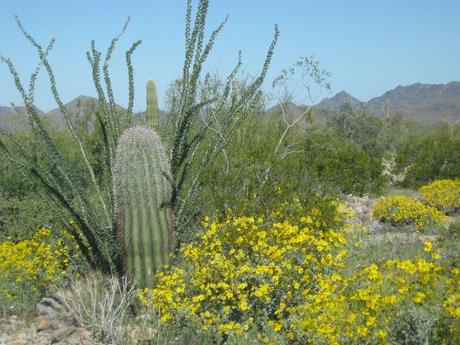 The diverse Arizona Upland of the Sonoran Desert is my favorite vegetation. I am far less fond of the weeds that covers the desert after fire. Weeds are often thorny or itchy, and they form single-species stands across entire vistas. Weed vegetation has none of the charm that comes with time and the gradual rise in diversity as competitive, long-lived plants arrive.
The diverse Arizona Upland of the Sonoran Desert is my favorite vegetation. I am far less fond of the weeds that covers the desert after fire. Weeds are often thorny or itchy, and they form single-species stands across entire vistas. Weed vegetation has none of the charm that comes with time and the gradual rise in diversity as competitive, long-lived plants arrive.
Evolution of life on Earth is a little like the weed colonization after a disaster such as a fire or a landslide. Of course, with no preexisting weeds and with such a huge area (the whole planet) life’s colonization of Earth took billions of years. From the fossil record, paleontologists conclude that while the number of larger species on Earth varied for life’s first few hundred million years, the number began increasing dramatically about 200 million years ago. How far this might go, and what might result is exciting to contemplate. But there is a problem. A young species with freakish abilities is exploding across the planet. The species has no competitors, predators, or resource limitations (yet), that can slow its spread or limit its numbers. The species’ phenomenal success is due to a huge jump in its intelligence. High intelligence has conferred incomparable advantages and has allowed the species to find ways to harvest Earth’s resources on an immense scale. All species have intelligence, but none has evolved anything nearly so powerful as the humans. At some point a few million years ago, one or more genetic changes out of the trillions that can occur, produced one or more individuals with great intelligence. The result is analogous to that of a species introduced to a new region where none of its limiting competitors or diseases is present. The species takes over. This is a common situation in science fiction and fantasy stories where aliens with advanced abilities invade Earth.
At the close of his chapter on instinct, Charles Darwin wrote “…one general law leading to the advancement of all organic beings–namely, multiply, vary, let the strongest live and the weakest die” (The Origin of Species by Means of Natural Selection or the Preservation of Favored Races in the Struggle for Life. Sixth London Edition, Hurst & Company, New York. 501: 259 p). What is happening on Earth today is that one species is so strong that it appears all others must die.
In SciFi stories, Earth is usually saved by either good luck or by brilliant acts by humans. In the current real-world situation, it seems the only chance the Earth might have is the appearance of a disease organism so powerful that it can reduce or eliminate humans. Dolphins or parrots might do it, but probably not.
A great and powerful germ is not necessary. Earth’s production of useful resources (food, water, fiber) is declining. Eventually, this must begin to limit the humans. Just as bacteria in a Petri dish will use up resources and die, humans will eventually do the same. But dolphins or disease would be much better, because then more species and resources would survive.
The mutation that gave humans intelligence has been wildely successful, but it is flawed. Intelligence, as it appears in humans, lacks a quality that would let it become a permanent part of Earth’s biological systems: wisdom.

